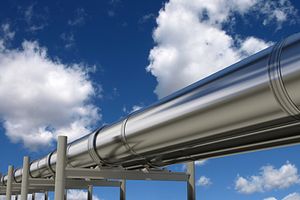As high-ranking Indian officials continue to beat a path to Tehran to bolster Indo-Iranian energy cooperation and secure Iranian natural gas imports to India, one of Iran’s senior diplomats in South Asia sent a perplexing signal about the future delivery of Iranian gas to the Subcontinent. The curious comments were made by Iran’s ambassador in Dhaka, Abbas Vaezi. If representative of the current thinking of Iran’s policymakers, Vaezi’s comments could indicate a marked shift in Tehran’s plans to transport natural gas to India.
Speaking before the Diplomatic Correspondents’ Association, Bangladesh, on September 1, Vaezi proposed extending the Iran-Pakistan (IP) natural gas pipeline to Bangladesh. The ambassador’s proposal, widely reported in the Iranian press as well as in Bangladesh, is curious on several different accounts. Any extension of the IP pipeline to Bangladesh would have to cross a considerable swath of Indian territory. The air travel distance between Nawabshah, Pakistan, the current proposed endpoint for the IP pipeline, and the Bangladeshi border is more than 1,000 miles (1,609 km), most of which is across India. Such a route would not be feasible without Indian participation and Vaezi hinted that Tehran had already engaged New Delhi on the topic.
The IP pipeline was originally conceived in 1995 as the Iran-Pakistan-India (IPI) pipeline, New Delhi withdrew from the project in 2009 under pressure from Washington in the wake of the 2008 U.S.-India Civil Nuclear agreement. However, India cannot rejoin the project so easily after the sanctions against Iran are removed following the agreement between Iran and the permanent members of the UN Security Council plus Germany (P5+1) over Iran’s nuclear program. The reason is that India’s participation would now require the acquiescence of China, which has provided $2 billion in financing for the IP pipeline’s construction with the aim of securing the flow of Iranian natural gas to China.
In an energy geopolitics power move, Beijing concluded an agreement with Islamabad to construct most of Pakistan’s portion of the IP pipeline, jumping ahead of India in Sino-Indian mini “Great Game” to orient the flow of gas exports from a post-sanctions Iran. The IP pipeline agreement is part of a $46 billion infrastructure package to establish the China-Pakistan Economic Corridor(CPEC), extending from the Chinese-administered Gwadar port on Pakistan’s Indian Ocean coast to China’s westernmost city Kashgar (Kashi) in Xinjiang. Iran has already built its section of the pipeline to the Pakistani border while Pakistan is slated build the remaining 80 km of the pipeline from Gwadar to the Iranian border.
In addition to increasing Pakistan’s economic reliance on Beijing and drawing Iran into China’s One Belt, One Road (OBOR) initiative via CPEC, the IP pipeline is imperative for Beijing because, if extended, it can transport Iranian natural gas to China’s Xinjiang province. Bordering on Central Asia, the great distances between Xinjiang and China’s eastern ports, which receive sea-borne, liquefied natural gas (LNG), make it commercially prohibitive to meet Xinjiang’s growing energy demand from piped shipments of re-gasified LNG. Still, Beijing needs reliable gas supplies to rapidly develop the restive Uighur minority province to secure its integration within China. For these reasons, Beijing will look askance on Vaezi’s proposal to redirect Iran’s natural gas to India and Bangladesh via a pipeline built and financed by Beijing.
From Bangladesh’s perspective, the proposal is also curious. It would hardly be commercially viable to transport natural gas via a pipeline spanning the distance from Iran’s South Pars gas field in the Persian Gulf across the breadth of the Subcontinent to Bangladesh. Moreover, Bangladesh has its own considerable offshore natural gas reserves, estimated by some to be the largest in the Asia-Pacific.
For India, Vaezi’s proposal is perhaps the most perplexing, as New Delhi has been pushing for the construction of an Iran-Oman-India pipeline as its preferred method of delivery of Iranian natural gas. A stand-alone, undersea pipeline to receive gas from Iran’s South Pars field via Oman to India’s west coast would constitute New Delhi’s own energy geopolitics power move, establishing energy connectivity with Persian Gulf natural gas suppliers across the western Indian Ocean.
Four days after Vaezi’s remarks in Dhaka, the Managing Director of National Iranian Gas Exports Company (NIGEC) Alireza Kameli informed the Iranian media that he was about to empower the Iranian Offshore Engineering and Construction Company to conduct a feasibility study for the construction of the 400 km undersea pipeline connecting Iran and Oman. The NIGEC action marks an important step forward in the construction of the Iran-Oman pipeline, advancing the project that was agreed upon by Tehran and Muscat in 2013.
For New Delhi, NIGEC director Kameli’s press statement is also a positive sign for the future construction an Iran-Oman-India pipeline and stands in striking juxtaposition to the comments made by Vaezi a few days prior.
The most likely explanation is that Vaezi’s remarks represent another example of the discrepancy between the seasoned technocrats in the state-owned energy companies under Iran’s Ministry of Petroleum and the diplomats of Iran’s foreign ministry. While the former are usually circumspect in their comments, the latter sometimes make pronouncements out of geopolitical concerns without regard to commercial rationality.
The geopolitical and diplomatic game to secure Iranian natural gas exports is still early in the first half with the final results uncertain. As the comments by Iran’s ambassador to Bangladesh indicate, Iran’s energy diplomacy does not necessarily speak with a single voice. Policymakers in New Delhi, Dhaka, and elsewhere in Asia would be well advised to remember that Iranian policymakers themselves are weighing conflicting geopolitical and commercial imperatives.
Micha’el Tanchum is a Senior Fellow with the Eurasian Energy Futures Initiative at the Atlantic Council. Follow him on Twitter @michaeltanchum.
































